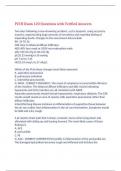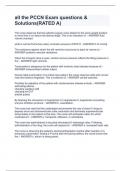Pccn exam Study guides, Class notes & Summaries
Looking for the best study guides, study notes and summaries about Pccn exam? On this page you'll find 690 study documents about Pccn exam.
Page 4 out of 690 results
Sort by

-
PCCN Exam BUNDLE| Questions and Answers 100% Verified
- Package deal • 21 items • 2024
-
- $37.49
- + learn more
PCCN Exam BUNDLE| Questions and Answers 100% VerifiedPCCN Exam BUNDLE| Questions and Answers 100% VerifiedPCCN Exam BUNDLE| Questions and Answers 100% VerifiedPCCN Exam BUNDLE| Questions and Answers 100% VerifiedPCCN Exam BUNDLE| Questions and Answers 100% VerifiedPCCN Exam BUNDLE| Questions and Answers 100% VerifiedPCCN Exam BUNDLE| Questions and

-
PCCN Exam 120 Questions with Verified Answers,100% CORRECT
- Exam (elaborations) • 40 pages • 2024
- Available in package deal
-
- $11.49
- + learn more
PCCN Exam 120 Questions with Verified Answers Two days following a near-drowning accident, a pt is dyspneic, using accessory muscles, expectorating large amounts of secretions and reporting feeling of impending death. Changes to the assessment data include RR- 24 TO 36 CXR clear to bilateral diffuse infiltrates ABG 40% face mask or 100% non-rebreather mask pO2 120 mm Hg to 56 mm Hg pCO2 33 mmHg to 56 mmHg pH 7.42 to 7.35 HCO3 24 meq/L to 27 mEq/L Which of the ff do these changes mos...

-
PCCN Exam 200 Questions with Verified Answers,100% CORRECT
- Exam (elaborations) • 73 pages • 2024
- Available in package deal
-
- $12.99
- + learn more
PCCN Exam 200 Questions with Verified Answers Coronary artery perfusion is dependent upon: A. diastolic pressure B. systolic pressure C. afterload D. systemic vascular resistance (SVR) - CORRECT ANSWER A. diastolic pressure Diastolic pressure in the aortic root is higher than left ventricular end-diastolic pressure (LVEDP), the pressure exerted on the ventricular muscle at the end of diastole when the ventricle is full. This enables blood to flow from a higher pressure through open arter...

-
PCCN Exam Questions And Revised Correct Answers & Rationale
- Exam (elaborations) • 90 pages • 2024
-
- $17.99
- + learn more
PCCN Exam Questions And Revised Correct Answers & Rationale 1. Coronary artery perfusion is dependent upon: A. diastolic pressure B. systolic pressure C. afterload D. systemic vascular resistance (SVR) - ANSWER : A. diastolic pressure Diastolic pressure in the aortic root is higher than left ventricular end-diastolic pressure (LVEDP), the pressure exerted on the ventricular muscle at the end of diastole when the ventricle is full. This enables blood to flow from a higher pressure ...

-
PCCN Exam Questions and Answers 100% Verified
- Exam (elaborations) • 12 pages • 2024
- Available in package deal
-
- $11.49
- + learn more
PCCN Exam Questions and Answers 100% VerifiedPCCN Exam Questions and Answers 100% VerifiedPCCN Exam Questions and Answers 100% VerifiedPCCN Exam Questions and Answers 100% Verified What is the function of the cardiovascular system - ANSWER-to drive O2 to the cell so that the cell can make ATP for energy production What is the formula for CARDIAC OUTPUT - ANSWER-Stroke volume x Heart Rate CO = HR X SV ( Preload + Afterload + Contractility) What is the term for the amount of blood tha...

-
PCCN EXAM Questions With 100% Verified Answers Latest Update 2024/2025 (GRADED)
- Exam (elaborations) • 50 pages • 2024
-
- $17.49
- + learn more
PCCN EXAM Questions With 100% Verified Answers Latest Update 2024/2025 (GRADED) Coronary artery perfusion is dependent upon: A. diastolic pressure B. systolic pressure C. afterload D. systemic vascular resistance (SVR) A. diastolic pressure Diastolic pressure in the aortic root is higher than left ventricular end-diastolic pressure (LVEDP), the pressure exerted on the ventricular muscle at the end of diastole when the ventricle is full. This enables blood to flow from a higher pressure ...

-
GI PCCN Exam 52 Questions with Verified Answers,100% CORRECT
- Exam (elaborations) • 28 pages • 2024
- Available in package deal
-
- $10.99
- + learn more
GI PCCN Exam 52 Questions with Verified Answers The most common causative organism of antibiotic-associated colitis is A. Clostridium difficile. B. Staphylococcus aureus. C. Salmonella. D. Escherichia coli. - CORRECT ANSWER A. Clostridium difficile is an anaerobic gram-positive, spore-forming, toxin-producing bacillus that causes antibiotic-associated colitis. It colonizes the human intestinal tract after the normal gut flora have been altered by antibiotic therapy. It produces exotoxins ...

-
PCCN EXAMS BUNDLE
- Package deal • 8 items • 2024
-
- $35.49
- + learn more
Exam (elaborations) PCCN EXAM QUESTIONS AND ANSWERS 2 Exam (elaborations) PCCN PRACTICE EXAM Q&A 3 Exam (elaborations) ALL THE PCCN EXAM QUESTIONS 4 Exam (elaborations) PCCN EXAM QUESTIONS AND ANSWERS 5 Exam (elaborations) PCCN EXAM QUESTIONS AND ANSWERS 6 Exam (elaborations) PCCN PRACTICE QUESTIONS AND ANSWERS 7 Exam (elaborations) PCCN REVI

-
all the PCCN Exam questions & Solutions(RATED A)
- Exam (elaborations) • 45 pages • 2024
- Available in package deal
-
- $12.99
- + learn more
The nurse observes that the patient's jugular veins distend in the semi-upright position to more than 5 cm above the sternal angle. This is an indication of: - ANSWER fluid volume overload. what is normal Pulmonary artery occlusion pressure (PAOP)? - ANSWER 5-12 mmHg The resistance against which the left ventricle must pump to eject its volume is: - ANSWER systemic vascular resistance. When the tricuspid valve is open, central venous pressure reflects the filling pressure in the: - ANS...

-
PCCN EXAM Questions With 100% Verified Answers Latest Update 2024/2025 (GRADED)
- Exam (elaborations) • 50 pages • 2024
-
- $16.49
- + learn more
PCCN EXAM Questions With 100% Verified Answers Latest Update 2024/2025 (GRADED) Coronary artery perfusion is dependent upon: A. diastolic pressure B. systolic pressure C. afterload D. systemic vascular resistance (SVR) A. diastolic pressure Diastolic pressure in the aortic root is higher than left ventricular end-diastolic pressure (LVEDP), the pressure exerted on the ventricular muscle at the end of diastole when the ventricle is full. This enables blood to flow from a higher pressure ...

That summary you just bought made someone very happy. Also get paid weekly? Sell your study resources on Stuvia! Discover all about earning on Stuvia


